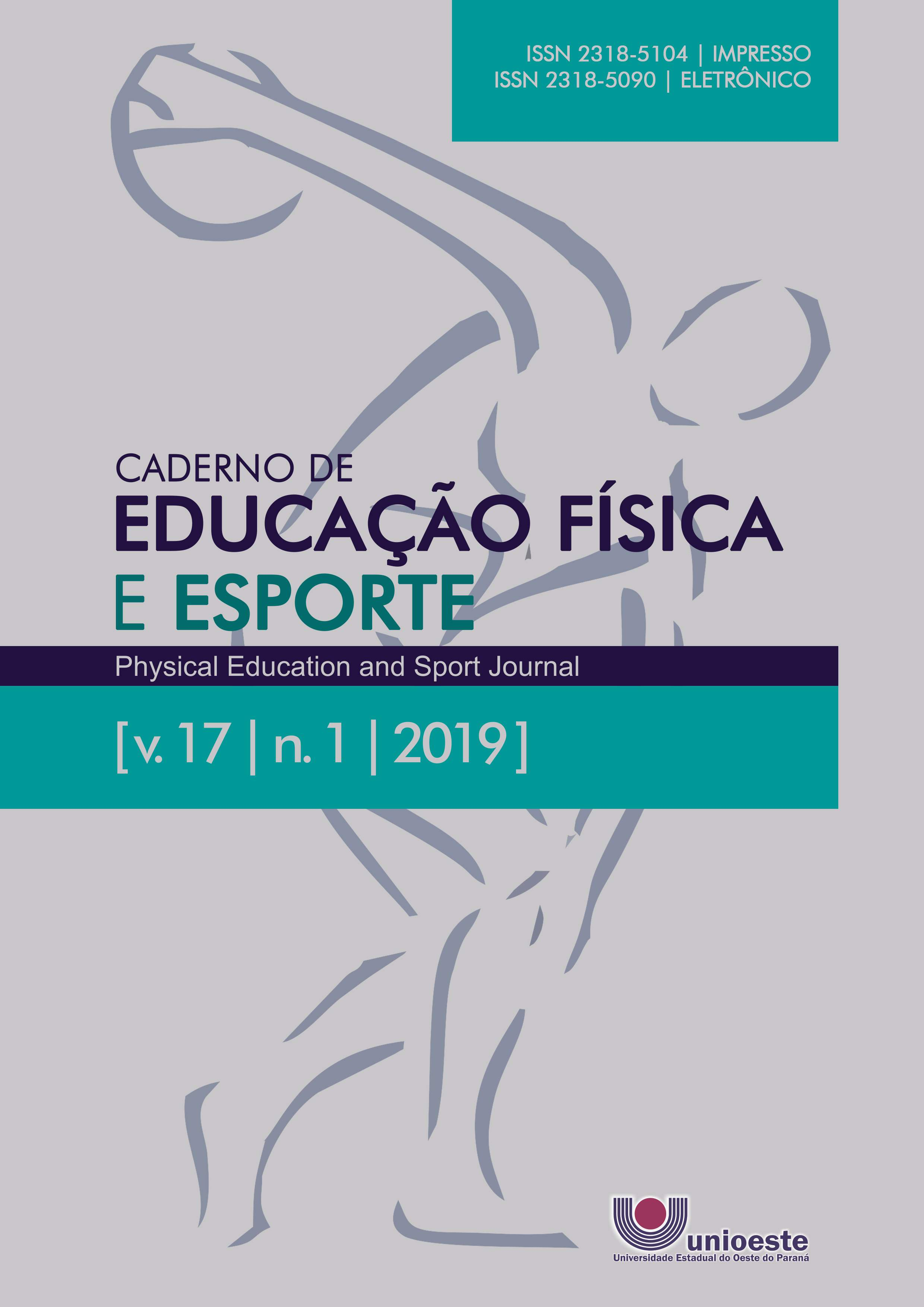Projeto Piracema - natação para pessoas com deficiência: um relato de experiência
DOI:
https://doi.org/10.36453/2318-5104.2019.v17.n1.p343Palabras clave:
Inclusão, Pessoas com deficiência, Natação.Resumen
Introdução: As experiências motoras diversas são de suma importância no desenvolvimento dos indivíduos. E, para pessoas com deficiência, além de contribuir no desenvolvimento de suas habilidades, o esporte configura-se como um meio de socialização. A natação vem sendo um dos motivadores mais efetivos, pois as atividades realizadas podem ser facilitadas por serem no meio líquido. Objetivo: Relatar a experiência vivenciada no Projeto Piracema - Natação para pessoas com deficiência, apontando as etapas desenvolvidas e aspectos relevantes deste projeto de extensão. Métodos: A metodologia consiste em um estudo descritivo das atividades desenvolvidas e observadas a partir da vivência com pessoas com deficiência que participam do projeto. Resultados: Foi possível observar que as atividades do projeto foram estudadas e planejadas observando as limitações dos alunos e buscando uma melhor adaptação dos mesmos ao meio líquido. Dessa forma, os participantes demonstraram-se entusiasmados e incentivados a participar das aulas e realizar as atividades. Foram utilizados diferentes materiais, métodos e exercícios, de maneira a diversificar cada aula, o que mostrou boa receptividade dos participantes que, demonstraram-se incentivados à participação. Observou-se também a importância na formação dos acadêmicos envolvidos que vivenciaram atividades associadas a conceitos de formação com a prática de atuação. Conclusão: Conclui-se que as atividades aquáticas para pessoas com deficiência contribuem na formação social do indivíduo e no desenvolvimento de suas habilidades motoras e cognitivas. Dessa forma, o projeto se faz de extrema relevância para a comunidade e para os profissionais que atuarão nesta área de conhecimento.
Descargas
Citas
ARAÚJO, L. G.; SOUZA, T. G. Natação para pessoas com necessidades especiais. Lectures, Educación Física y Deportes, Revista Digital, Buenos Aires v. 14, n. 137, 2009. Disponível em: . Acessado em: 25 de agosto de 2018.
BARBOSA, T. As habilidades motoras aquáticas básicas. Lectures, Educación Física y Deportes, Revista Digital, Buenos Aires, v. 6, n. 33, 2001. Disponível em: <https://www.efdeportes.com/efd33a/aquat. htm>. Acessado em: 20 de setembro de 2018.
CASTRO, E. M. de. Atividade física adaptada. São Paulo: Tecmedd, 2005.
DELLANI, M. P.; MORAES, D. N. M. Inclusão: caminhos, encontros e descobertas. Revista de Educação do IDEAU, Bagé, v. 7, n. 15, p. 1-13, 2012.
DIAS, N. F.; PRADO JÚNIOR, M. V. do. Natação adaptada: análise da função pulmonar de pessoas com deficiência. Sobama, Marília, v. 17, n. 1, p. 25-30, 2016.
FABIANI, D. J. F.; SCAGLIA, A. J.; ALMEIDA, J. J. G. de. O jogo de faz de conta e o ensino da luta para crianças: criando ambientes de aprendizagem. Pensar a Prática, Goiânia, v. 19, n. 1, p. 130-42, 2016.
FRAGALA-PINKHAM, M.; HALEY, S. M.; O’NEIL, M. E. Group aquatic aerobic exercise for children with disabilities. Developmental Medicine & Child Neurology, London, v. 50, n. 11, p. 822-7, 2008.
FREGOLENTE, G.; PRADO JÚNIOR, M. V. do. A inclusão da natação na vida da pessoa com deficiência - uma análise a partir da teoria ecológica do desenvolvimento. Sobama, Marília, v. 16, n. 1, p. 33-8, 2015.
FREIRE, M. Ti-bum: mergulhando no lúdico. In: SCHUWARTZ, G. M. (Org.). Dinâmica lúdica: novos olhares. São Paulo: Manole, 2004.
MANFROI, M. N.; FERREIRA, J. R. P.; MARINHO, A. Por outra educação física escolar: natureza, cultura e experiências na Costa da Lagoa (SC). Pensar a Prática, Goiânia, v. 18, n. 3, p. 675-86, 2015.
NASCIMENTO, L. C. G.; PINEDA, A. C.; CASTRO, G. G.; TONELLO, M. G. M. Natação para indivíduos com deficiência intelectual: uma revisão integrativa. Podium Sport, São Paulo, v. 8, n. 1, p. 140-50, 2019.
PAN, C. Y. Effects of water exercise swimming program on aquatic skills and social behaviors in children with autism spectrum disorders. Autism, Bath, v. 14, n. 1, p. 9-28, 2010.
PAN, C. Y. The efficacy of an aquatic program on physical fitness and aquatic skills in children with and without autism spectrum disorders. Research in Autism Spectrum Disorders, London, v. 5, n. 1, p. 657-65, 2011.
RODRIGUES, D. Atividade motora adaptada: a alegria do corpo. São Paulo: Artes Médicas, 2006.
RODRIGUES, M. N.; LIMA, S. R. Atividades motoras aquáticas na coordenação corporal de adolescentes com deficiência intelectual. Revista Brasileira de Ciências do Esporte, Porto Alegre, v. 36, n. 2, p. 369-81, 2014.
ROSA NETO, F. Manual de avaliação motora. Porto Alegre: Artmed, 2002.
SANTOS, C. A. dos. Natação: ensino e aprendizagem. Rio de Janeiro: Sprint, 1996.
SOUZA, J. V.; CHAVES, R. S. O surfe adaptado para pessoas com deficiência visual: uma “onda” de sensações. Revista Adapta, Presidente Prudente, v. 11, n. 1, p. 13-8, 2015.
TEIXEIRA-ARROYO, C.; OLIVEIRA, S. R. G. Atividade aquática e psicomotricidade de crianças com paralisia cerebral. Motriz, Rio Claro, v. 13, n. 2, p. 97-105, 2007.
TORRI, D.; VAZ, A. F. Esporte paralímpico: difícil inclusão, incorporação tecnológica, corpos competitivos. Práxis Educativa, Ponta Grossa, v. 12, n. 2, p. 19-33, 2017.
VIEIRA, M. C. A natação para a pessoa com deficiência: oferecimento e envolvimento de programas em Campinas e região. Conexões, Campinas, v. 16, n. 2, p. 199-212, 2018.
WINNICK, J. P. Adapted physical education and sport. 5. ed. Champaign: Human Kinetics, 2010.
Descargas
Publicado
Cómo citar
Número
Sección
Licencia
Derechos de autor 2019 Direitor Autorais Partilhados

Esta obra está bajo una licencia internacional Creative Commons Atribución-NoComercial-CompartirIgual 4.0.
Los derechos de autor permiten descargar, compartir, copiar, distribuir, adaptar, transformar, exhibir y reproducir total o parcialmente el artículo para cualquier propósito legal, siempre que no tenga fines lucrativos y se cite la fuente.
Informamos que todo el contenido del texto publicado, así como sus posibles errores ortográficos y gramaticales, es de total responsabilidad de sus autores, sin que el Caderno de Educação Física e Esporte o nuestros Evaluadores Ad Hoc asuman ninguna implicación legal ni responsabilidad por posibles negligencias en el uso del idioma portugués o extranjero.



















